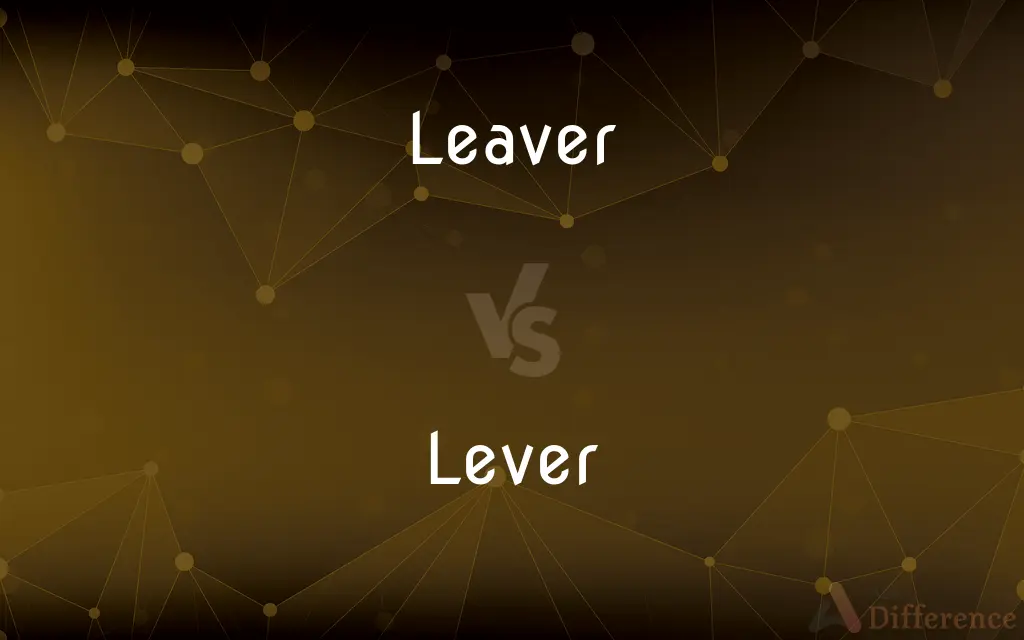Leaver vs. Lever — What's the Difference?
By Tayyaba Rehman & Maham Liaqat — Updated on April 5, 2024
Leaver refers to someone who departs from a place or position, while a lever is a tool used to apply force or control.

Difference Between Leaver and Lever
Table of Contents
ADVERTISEMENT
Key Differences
Leaver is a term used to describe an individual who leaves or exits a situation, group, or location, often implying a voluntary departure. On the other hand, a lever is a mechanical device, usually a rigid bar, that is used to exert a force on one point by applying force at another point, following the principle of mechanical advantage.
While leavers are associated with social, personal, or professional contexts, highlighting the human aspect of departure or change, levers are purely mechanical and are associated with physical processes, tools, and engineering concepts. The distinction here is between the human and the mechanical, reflecting different spheres of understanding and application.
Leavers might be discussed in terms of psychological, social, or economic implications of their decision to leave, focusing on reasons behind such decisions and their consequences. In contrast, the discussion around levers would revolve around their efficiency, types, and applications in various mechanical and engineering solutions, including their role in simplifying work and enhancing mechanical advantage.
Understanding the concept of a leaver requires comprehension of human motives and the context of departure, whereas understanding a lever involves principles of physics and mechanics. This difference underscores the nature of the terms, with one rooted in human actions and the other in physical laws.
Comparison Chart
Definition
An individual who leaves a place or position.
A rigid bar used to move an object with force.
ADVERTISEMENT
Context
Social, professional, or personal.
Mechanical, engineering.
Primary Focus
The act of leaving or departing.
Application of force or mechanical advantage.
Underlying Principles
Human decisions and actions.
Physical laws of mechanics.
Types/Classification
Not applicable.
First, second, and third-class levers.
Compare with Definitions
Leaver
A student who completes or abandons their studies.
The school organized a ceremony to honor the leavers.
Lever
A tool to lift or move heavy objects.
They used a lever to lift the corner of the chest.
Leaver
A participant who withdraws from a group or organization.
As a leaver, she found new opportunities outside the club.
Lever
Part of a mechanism that initiates or controls action.
The pilot pulled the lever to start the engine.
Leaver
A person who resigns from a job.
The company offered a generous package to encourage leavers.
Lever
A device to apply pressure or secure an object.
The lever held the gears in place during the repair.
Leaver
An individual moving from one place to settle in another.
The town’s economy was affected by the number of leavers.
Lever
A means to achieve a goal or exert influence.
Negotiation is a powerful lever in business.
Leaver
Someone who exits a relationship or agreement.
Being a leaver, he felt relief after ending the toxic partnership.
Lever
A bar used to operate or adjust machinery.
He pushed the lever to switch the machine off.
Leaver
Leaver or Leavers may refer to:
Lever
A lever ( or US: ) is a simple machine consisting of a beam or rigid rod pivoted at a fixed hinge, or fulcrum. A lever is a rigid body capable of rotating on a point on itself.
Leaver
To go out of or away from
Not allowed to leave the room.
Lever
A rigid bar resting on a pivot, used to move a heavy or firmly fixed load with one end when pressure is applied to the other
A tyre lever
Leaver
To go without taking or removing
Left my book on the bus.
Lever
Lift or move with a lever
She levered the lid off the pot with a screwdriver
Leaver
To omit or exclude
Left out the funniest part of the story.
Lever
A simple machine consisting of a rigid bar pivoted on a fixed point and used to transmit force, as in raising or moving a weight at one end by pushing down on the other.
Leaver
To have as a result, consequence, or remainder
The car left a trail of exhaust fumes. Two from eight leaves six.
Lever
A projecting handle used to adjust or operate a mechanism.
Leaver
To cause or allow to be or remain in a specified state
Left the lights on.
Lever
A means of accomplishing; a tool
Used friendship as a lever to obtain advancement.
Leaver
To have remaining after death
Left a young son.
Lever
To move or lift with a lever
Levered up the manhole cover.
Leaver
To bequeath
Left her money to charity.
Lever
To move (oneself, for example) in a manner resembling the use of a lever
"[He] levered himself out the window all the way to his waist" (Stephen King).
Leaver
To give over to another to control or act on
Leave all the details to us.
Lever
To fund at least in part with borrowed money; leverage.
Leaver
To abandon or forsake
Leave home.
Left her husband.
Lever
(mechanics) A rigid piece which is capable of turning about one point, or axis (the fulcrum), and in which are two or more other points where forces are applied; — used for transmitting and modifying force and motion.
Leaver
To remove oneself from association with or participation in
Left the navy for civilian life.
Lever
Specifically, a bar of metal, wood or other rigid substance, used to exert a pressure, or sustain a weight, at one point of its length, by receiving a force or power at a second, and turning at a third on a fixed point called a fulcrum. It is usually named as the first of the six mechanical powers, and is of three kinds, according as either the fulcrum F, the weight W, or the power P, respectively, is situated between the other two, as in the figures.
Leaver
To give or deposit, as for use or information, upon one's departure or in one's absence
He left a note for you. Leave your name and address.
Lever
A small such piece to trigger or control a mechanical device (like a button).
Leaver
To cause or permit to be or remain
Left myself plenty of time.
Lever
(mechanics) A bar, as a capstan bar, applied to a rotatory piece to turn it.
Leaver
(Nonstandard) To allow or permit; let.
Lever
(mechanics) An arm on a rock shaft, to give motion to the shaft or to obtain motion from it.
Leaver
To set out or depart; go
When can you leave?.
Lever
A crowbar.
Leaver
One who leaves.
This year's school leavers have excellent grades.
He's a leaver, not a stayer: he'll never be happy tied down in one place.
Lever
(rare) A levee.
Leaver
Alternative case form of Leaver
Lever
(transitive) To move with a lever.
With great effort and a big crowbar I managed to lever the beam off the floor.
Leaver
One who leaves, or withdraws.
Lever
To use, operate or move (something) like a lever (physically).
Leaver
Someone who leaves
Lever
To use (something) like a lever (in an abstract sense).
Lever
To increase the share of debt in the capitalization of a business.
Lever
(obsolete) Rather.
Lever
More agreeable; more pleasing.
Lever
Rather.
For lever had I die than see his deadly face.
Lever
A rigid piece which is capable of turning about one point, or axis (the fulcrum), and in which are two or more other points where forces are applied; - used for transmitting and modifying force and motion. Specif., a bar of metal, wood, or other rigid substance, used to exert a pressure, or sustain a weight, at one point of its length, by receiving a force or power at a second, and turning at a third on a fixed point called a fulcrum. It is usually named as the first of the six mechanical powers, and is of three kinds, according as either the fulcrum F, the weight W, or the power P, respectively, is situated between the other two, as in the figures.
Lever
A bar, as a capstan bar, applied to a rotatory piece to turn it.
Lever
A rigid bar pivoted about a fulcrum
Lever
A simple machine that gives a mechanical advantage when given a fulcrum
Lever
A flat metal tumbler in a lever lock
Lever
To move or force, especially in an effort to get something open;
The burglar jimmied the lock
Raccoons managed to pry the lid off the garbage pail
Common Curiosities
What is a leaver?
A leaver is someone who exits a situation, group, or location, often by their own choice.
Can a person be a lever?
Metaphorically, yes. A person can be considered a lever if they significantly influence a situation.
Are there different types of leavers?
While not classified formally, leavers can be differentiated by context, such as job leavers or relationship leavers.
Do leavers always leave voluntarily?
Mostly, yes, but the term can also apply to those who leave due to circumstances beyond their control.
What is a lever?
A lever is a simple mechanical device consisting of a bar that pivots on a fixed point to apply force.
Why are leavers important to understand?
Understanding leavers helps in analyzing the reasons behind departures and their impact on communities or organizations.
Can leavers face challenges after leaving?
Yes, leavers can face emotional, social, or financial challenges after their departure.
Where are levers commonly used?
Levers are used in various applications, from simple tools to complex machinery and devices.
How do levers work?
Levers work by applying force at one end to lift or move an object at the other end, using a fulcrum as the pivot point.
What is the principle behind a lever?
The principle behind a lever is the law of the lever, which states that the amount of force multiplied by the distance from the fulcrum is constant.
How does one become a leaver?
One becomes a leaver by making a decision to leave or exit from a specific situation or group.
What are the types of levers?
There are three types: first-class, second-class, and third-class, categorized by the relative positions of the fulcrum, load, and effort.
What motivates a leaver to leave?
Motivations can range from seeking better opportunities, personal growth, to escaping unfavorable conditions.
Can the concept of a lever be applied in non-physical contexts?
Yes, in a metaphorical sense, strategies or actions can be considered levers if they effectively influence outcomes.
Why is the lever considered a simple machine?
Because it amplifies force, making it easier to move or lift objects, which is a fundamental mechanical advantage.
Share Your Discovery

Previous Comparison
Revival vs. Revive
Next Comparison
Plan vs. StrategyAuthor Spotlight
Written by
Tayyaba RehmanTayyaba Rehman is a distinguished writer, currently serving as a primary contributor to askdifference.com. As a researcher in semantics and etymology, Tayyaba's passion for the complexity of languages and their distinctions has found a perfect home on the platform. Tayyaba delves into the intricacies of language, distinguishing between commonly confused words and phrases, thereby providing clarity for readers worldwide.
Co-written by
Maham Liaqat















































